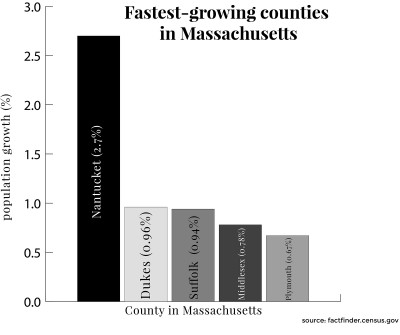Trends for Boston’s metropolitan area populations match those of metropolitan areas across the country, according to an updated U.S. Census Bureau report released Thursday. The numbers indicated a trend of more domestic residents leaving Boston while international residents were gained, as seen in other cities across the nation.

“If you look at the components of change which are birth, death, domestic and international migration, it looks like the Boston area is losing people to other parts of the country through domestic immigration, but they’re gaining people through international migration,” said Benjamin Bolender, chief of the Population Estimates Branch of the U.S. Census Bureau.
Boston’s trend mirrors those of other cities including New York, Miami and Chicago, Bolender said. San Francisco is one of the only metropolitan areas that is gaining residents from both domestic and international migration.
From July 1, 2013 to July 1, 2014, Suffolk County gained 8,734 international residents and lost 6,413 domestic residents, while the Boston metro area gained 29,134 domestic residents and lost 10,256, the report stated. Overall, Suffolk County increased by 0.94 percent, Bolender said.
“Our population estimates are primarily based on administrative records, so we start with the last centennial census, that’s our base, and we go forward with estimates and components of change primarily from administrative records,” he said.
The estimates are used for the distribution of federal funds, as well as by local government leaders, businesses and area planners to determine the location of goods and services, Bolender said.
“In general, demographics move for a variety of reasons,” he said. “They move for economic reasons for jobs, they move for things like going to school, going to college, a lot of international migration is based on going to college. When you look at the older end of the age distribution, you see people moving for things like natural amenities, moving closer to health services.”
Sandro Galea, dean of Boston University’s School of Public Health, said migration and population growth provides economic opportunity.
“A growing population represents tremendous opportunities for the economy, from the point of view of the generation of work in opportunity, as well as from the point of view of consumers and the base on which to build economic infrastructure,” Galea said.
Challenges also come with opportunities for public health as the population grows, he said.
“The challenges are many, including making sure the conditions that they keep people healthy, including living conditions, social structural conditions, availability of health resources which are adequate and appropriate to meet the growing population, but it also represents opportunities because as populations grow, we are creating new structures and new conditions that help shape the population,” Galea said.
Several residents said the growth of the city is a good thing, though there are drawbacks and multiple reasons for either moving out or into the city.
Jaime Winchenbach, 29, of Brighton, said cost has a lot to do with population flow in Boston.
“It’s very expensive to live here, and if you don’t have the money to live here then you move away from downtown and out to the suburbs and then all of a sudden you’re so far away from everything that you loved in the city anyway that you might as well not live here,” she said. “There are a lot of other places to live that are cheaper and have better job markets, depending on what field you’re in.”
Jeremy Singer, a sophomore in the School of Management, said the growth in Boston’s international population is indicative of Boston’s reputation abroad.
“It’s a testament to how international communities see potential in Boston as an economy,” he said, “as a growing network, and a place to go and thrive for one reason or another and trying to get a working opportunity.”
Kylie Ayal contributed to the reporting of this article.


